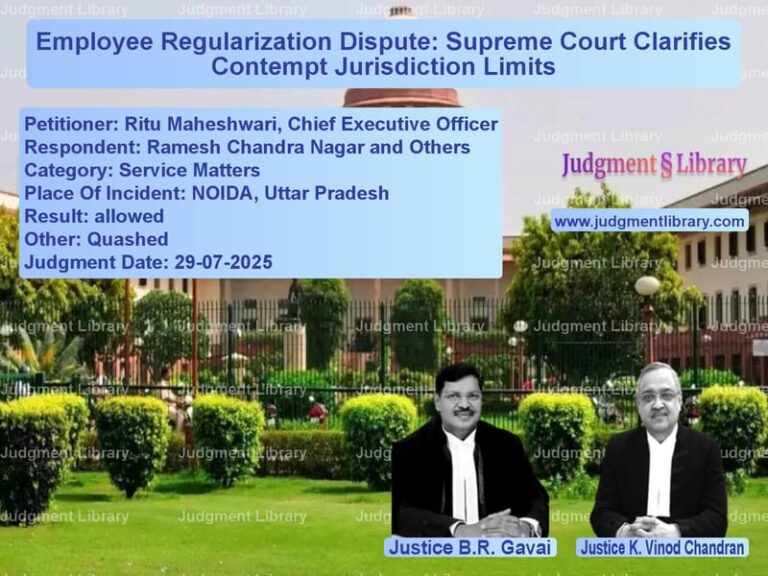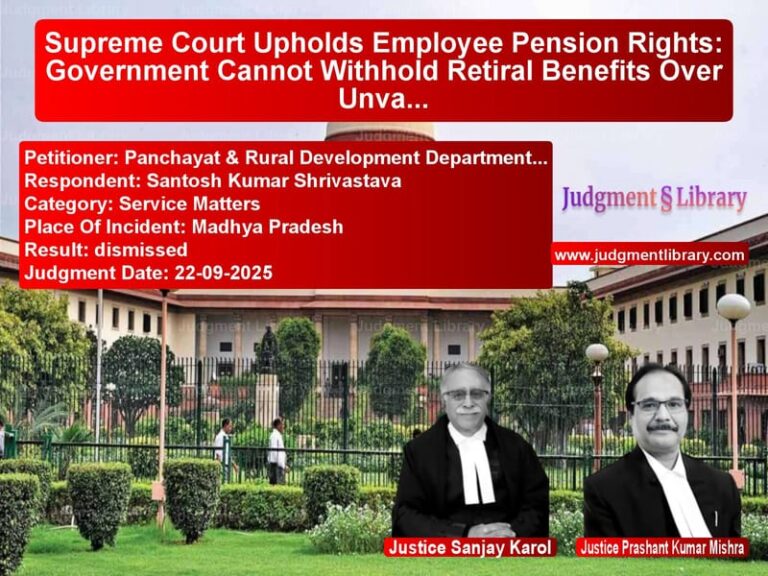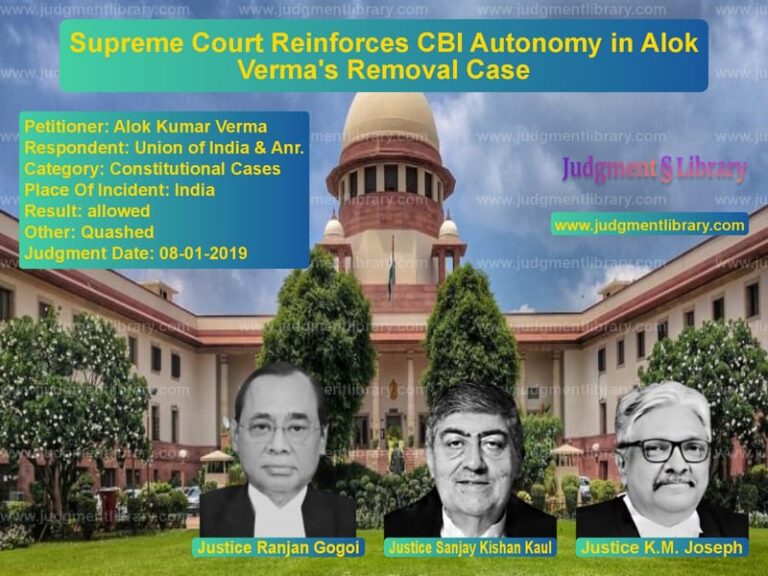Supreme Court Directs Ex-Gratia Compensation for COVID-19 Deaths
The Supreme Court of India, in a significant ruling, has directed the National Disaster Management Authority (NDMA) to provide ex-gratia compensation to families of individuals who died due to COVID-19. The case, Gaurav Kumar Bansal vs. Union of India & Ors., addressed the government’s responsibility under the Disaster Management Act, 2005, for compensating families of COVID-19 victims. The Court also laid down guidelines for issuing death certificates to ensure accurate reporting of COVID-19 deaths.
Background of the Case
The petitioner, Gaurav Kumar Bansal, filed a writ petition seeking ex-gratia financial assistance for families of those who lost their lives to COVID-19. The plea was based on Section 12(iii) of the Disaster Management Act, which mandates the government to provide minimum relief to disaster-affected individuals. The Supreme Court, in an earlier order on June 30, 2021, directed the government to formulate a compensation policy. The latest ruling reviews compliance with that directive.
Key Directions Issued by the Supreme Court
The Supreme Court directed the government to take the following actions:
- The NDMA must ensure ex-gratia compensation of Rs. 50,000 for the next of kin of individuals who died due to COVID-19.
- The compensation shall be disbursed by the District Disaster Management Authority (DDMA) through the State Disaster Response Fund (SDRF).
- The claims process must be simple and people-friendly, with a resolution deadline of 30 days.
- A District-Level Grievance Redressal Committee must be established to address disputes over certification of COVID-19 deaths.
Arguments by the Petitioner (Gaurav Kumar Bansal)
The petitioner argued that:
- Families of COVID-19 victims faced financial hardship, and the government was legally bound to provide assistance under the Disaster Management Act.
- The government’s failure to provide compensation amounted to a violation of fundamental rights under Article 21 of the Constitution.
- Many COVID-19 deaths were misclassified, and an independent grievance redressal mechanism was needed to correct erroneous death certificates.
Arguments by the Respondents (Union of India & NDMA)
The government contended that:
- The Disaster Management Act does not prescribe a fixed amount for ex-gratia assistance, and financial constraints had to be considered.
- Several existing schemes provided financial relief, and additional compensation should not duplicate these benefits.
- A new system for issuing correct death certificates had already been implemented to address concerns raised by the petitioner.
Supreme Court’s Rationale
The Supreme Court ruled in favor of the petitioner, holding that:
- Ex-gratia assistance is a statutory obligation under the Disaster Management Act, and failure to provide it would undermine the law’s purpose.
- Compensation must be provided without bureaucratic hurdles, ensuring that affected families receive timely relief.
- Misclassification of COVID-19 deaths must be addressed, and individuals should have an avenue to contest incorrect death certificates.
- States must proactively publish the process for availing compensation in newspapers and other media.
The Court observed: “The government’s obligation to provide relief under the Disaster Management Act is non-negotiable. Families of COVID-19 victims should not be left without financial assistance in their time of need.”
Guidelines for Issuance of Death Certificates
The Court also issued guidelines for issuing accurate death certificates:
- COVID-19 deaths must be certified based on RT-PCR/Molecular test results or clinical diagnosis.
- Deaths occurring within 30 days of a COVID-19 diagnosis must be treated as COVID-19 deaths, regardless of where they occurred.
- A District-Level Committee shall be formed to handle disputes regarding death certification and issue corrected documents where necessary.
Conclusion
The Supreme Court’s judgment in Gaurav Kumar Bansal vs. Union of India is a landmark ruling that ensures financial relief for COVID-19 victims’ families. It reinforces the government’s accountability under the Disaster Management Act and establishes clear guidelines for certification of COVID-19 deaths. The judgment provides a crucial framework for addressing grievances and ensuring timely assistance to those affected by the pandemic.
Petitioner Name: Gaurav Kumar Bansal.Respondent Name: Union of India & Ors..Judgment By: Justice M.R. Shah, Justice A.S. Bopanna.Place Of Incident: India.Judgment Date: 04-10-2021.
Don’t miss out on the full details! Download the complete judgment in PDF format below and gain valuable insights instantly!
Download Judgment: gaurav-kumar-bansal-vs-union-of-india-&-ors-supreme-court-of-india-judgment-dated-04-10-2021.pdf
Directly Download Judgment: Directly download this Judgment
See all petitions in Damages and Compensation
See all petitions in Public Interest Litigation
See all petitions in Judgment by Mukeshkumar Rasikbhai Shah
See all petitions in Judgment by A. S. Bopanna
See all petitions in allowed
See all petitions in Modified
See all petitions in supreme court of India judgments October 2021
See all petitions in 2021 judgments
See all posts in Civil Cases Category
See all allowed petitions in Civil Cases Category
See all Dismissed petitions in Civil Cases Category
See all partially allowed petitions in Civil Cases Category







